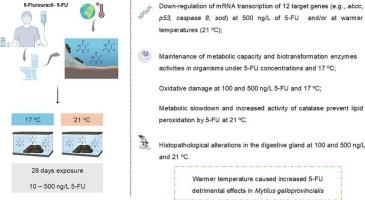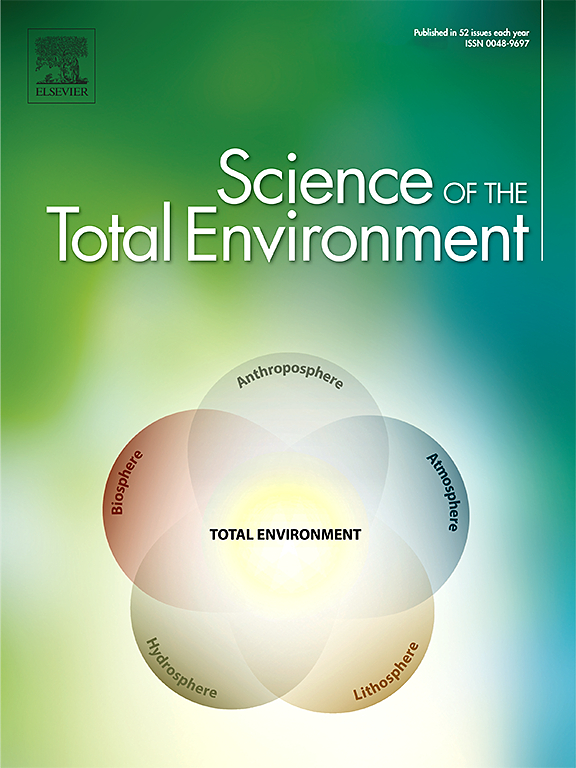水温升高对双壳类动物褐贻贝(Mytilus gallocialis)对抗肿瘤药物5-氟尿嘧啶基因表达、生化和组织病理学反应的影响
IF 8
1区 环境科学与生态学
Q1 ENVIRONMENTAL SCIENCES
引用次数: 0
摘要
本研究旨在评估5-氟尿嘧啶(5-FU)的潜在生态毒理学效应,5-氟尿嘧啶是一种已经在水生生态系统中发现的抗肿瘤药物,考虑实际和变暖的温度情景,对双壳贝贻贝(Mytilus galloprovincialis)的潜在生态毒理学效应。为此,在对照温度(17±1.0°C)和升温温度(21±1.0°C)下,将生物体暴露在增加5-FU浓度(10、100和500 ng/L)的环境中28天。选择靶基因的转录组学、生化反应和组织病理学改变被用来评估可能的有害影响。结果显示,在暴露于5-FU的生物体中,特别是在21°C时,与外源代谢途径和细胞凋亡相关的mRNA转录物整体下调。在17°C时,抗氧化防御不足以避免5-FU引起的细胞损伤,而在21°C时,代谢减缓避免了进一步的细胞损伤。然而,在21°C高浓度5-FU下观察到消化腺的组织病理学改变。总的来说,目前的研究结果表明,温度升高可能会增强5-FU对该物种的有害作用,尤其是代谢受到影响。本文章由计算机程序翻译,如有差异,请以英文原文为准。

Effects of water temperature increase on gene expression, biochemical, and histopathological responses of the bivalve species Mytilus galloprovincialis to the antineoplastic drug 5-fluorouracil
The present study aimed to assess the potential ecotoxicological effects of 5-fluorouracil (5-FU), an antineoplastic already found in aquatic ecosystems, towards the bivalve Mytilus galloprovincialis, considering actual and warming temperature scenarios. To this end, organisms were exposed for 28 days to increasing 5-FU concentrations (10, 100, and 500 ng/L) at control (17 ± 1.0 °C) and warming (21 ± 1.0 °C) temperatures. Transcriptomic of selected target genes, biochemical responses, and histopathological alterations were used to assess possible detrimental effects. Results showed an overall down-regulation of mRNA transcripts related to xenobiotic metabolization pathways and cell apoptosis in organisms exposed to 5-FU, especially at 21 °C. While at 17 °C, the antioxidant defenses were not enough to avoid cell damage caused by 5-FU, at 21 °C the metabolic slowdown avoided further cell damage. However, histopathological alterations in the digestive gland at 21 °C at high concentrations of 5-FU were observed. Overall, the present results indicate that the warming temperature may enhance the detrimental effects of 5-FU on this species, with metabolism being particularly affected.
求助全文
通过发布文献求助,成功后即可免费获取论文全文。
去求助
来源期刊

Science of the Total Environment
环境科学-环境科学
CiteScore
17.60
自引率
10.20%
发文量
8726
审稿时长
2.4 months
期刊介绍:
The Science of the Total Environment is an international journal dedicated to scientific research on the environment and its interaction with humanity. It covers a wide range of disciplines and seeks to publish innovative, hypothesis-driven, and impactful research that explores the entire environment, including the atmosphere, lithosphere, hydrosphere, biosphere, and anthroposphere.
The journal's updated Aims & Scope emphasizes the importance of interdisciplinary environmental research with broad impact. Priority is given to studies that advance fundamental understanding and explore the interconnectedness of multiple environmental spheres. Field studies are preferred, while laboratory experiments must demonstrate significant methodological advancements or mechanistic insights with direct relevance to the environment.
 求助内容:
求助内容: 应助结果提醒方式:
应助结果提醒方式:


